Middle East
Meta profits as ads promote illegal Israeli settlements in West Bank | Israel-Palestine conflict News

Facebook has platformed more than 100 paid advertisements promoting illegal settlements and far-right settler activity in the occupied West Bank, an Al Jazeera investigation has found, raising concerns that the social media giant is profiting from content that may violate international law.
Among the advertisements identified were also calls for the demolition of Palestinian homes, schools, and playgrounds, as well as fundraising appeals for Israeli military units operating in Gaza.
Facebook’s parent company Meta told Al Jazeera that any advertisements that ran on its platforms were reviewed by the company. While it admitted that some of the advertisements had since been removed for “violating our social issues, elections, and politics policies”, it did not specify whether the promotion of illegal settlements built on stolen Palestinian land breached those standards.
Legal experts told Al Jazeera that Meta could be complicit in violations of international law by approving, accepting payment, and publishing these advertisements. Brian Leishman, an MP in the United Kingdom parliament, described the findings as “extremely concerning”.
Illegal settlements advertised on Facebook
At least 52 paid advertisements from Israeli real estate companies were found promoting property sales in settlements across the occupied West Bank, targeting buyers from across Israel as well as some users in the UK and the United States. These advertisements were first published in March 2024, and many remain active on Facebook.
“We have robust processes and teams to review ads, and our ad review system is designed to review ads before they go live,” Meta told Al Jazeera. “This system relies primarily on automated technology to apply our Advertising Standards to the millions of ads that run across our apps, while relying on our teams to build and train these systems, and in some cases, to manually review ads.”
Among the advertisements identified by Al Jazeera were at least four promoting property sales in the illegal Israeli settlement of Ariel, 20km (12 miles) east of the Green Line in the occupied West Bank. The listings, written in Hebrew and targeting Israeli Facebook users, were paid for by a Facebook page called “Ramat Aderet”, which describes itself as offering “penthouses for a perfect quality of life”.
According to the website, the Ramat Aderet (Hillside Crown) project is “two neighbourhoods – north and south – with a total of 27 … buildings of between 4 to 8 floors. The apartments provide a complete urban living experience in a perfect neighbourhood.” The company has a valuation of $300m, according to PitchBook, a research firm and financial data provider.
Ramat Aderet did not respond to Al Jazeera’s request for comment.

The real estate company selling apartments and houses in Ariel is Ram Aderet, which has received financing from the First International Bank of Israel.
The Boycott, Divestment, and Sanctions (BDS) movement has long called for a boycott of the bank over its role in financing illegal settlements. Following pressure, in January 2014, the Dutch pension fund PGGM withdrew investments from the bank, while insurance giant AXA divested in 2022.
Another 48 advertisements were posted by Gabai Real Estate, advertising homes in the occupied West Bank settlement of Ma’ale Adumim and the Efrat settlement.
These homes are part of an expansion approved in March 2024 by Israel’s “Higher Planning Committee”, which is overseen by far-right Finance Minister Bezalel Smotrich, who, since 2023, no longer needs political or military approvals for expansion plans.
Yaniv Gabbay, the co-owner of Gabai Real Estate, told Al Jazeera: “Unfortunately, we were only able to post 48 ads because our budget is limited, and we advertise on many different platforms. But as we sell more homes to Jews returning home to Judea, our advertising budget will increase, and we can post more.”
Some Israelis refer to the occupied West Bank as Judea and Samaria, and the far-right government has made a push towards annexing the Palestinian territory.
The advertisements attempt to portray living in the settlements as idyllic. One lists an eight-bedroom mansion with a “huge garden, large succah area (seats 50+), above-ground pool, Jacuzzi, sauna, cold plunge, and breathtaking desert mountain views… A dream home just 20 minutes from Jerusalem! Don’t miss out!”
Carolina Are, a platform governance researcher at the Centre for Digital Citizens at Northumbria University, told Al Jazeera that “the real estate ads have been expertly framed as standard property listings, allowing them to elude moderation”.
“Moderators may not be aware of the nuances of international law either,” she added.
Under international law, all Israeli settlements in the West Bank are illegal. The transfer of an occupying power’s civilian population into occupied territory is considered a war crime under the Rome Statute of the International Criminal Court.
Professor Aoife O’Donoghue, international law expert from Queen’s University Belfast, said: “On the West Bank, property can be privately bought and sold. However, whether they have the legal title to sell that land at all would be highly questionable.
“If the Israeli government is facilitating it, and they are settlements, then they would be in violation of the Third Geneva Convention. Here, the Israeli government has a duty to prevent illegal settlements.”

Settler groups pushing for demolitions
Al Jazeera also identified 50 advertisements posted by Regavim, a far-right settler group founded by Smotrich in 2006, that has called for the destruction of Palestinian homes, schools, and a children’s water park. The group receives funding from the Israeli government via the West Bank settlement councils, and also Amana, another pro-settlement organisation sanctioned by the UK and US governments.
One advertisement celebrated the demolition of a Palestinian school, boasting: “Following our petition, Civil Administration forces tore down an illegal Palestinian school built in the Herodian Nature Reserve… This school is only one out of more than 100 illegal school buildings.”
Another advertisement called for a Palestinian water park to be demolished, claiming: “Palestinians are enjoying themselves at our expense.”
Regavim defended the campaign against the school, saying it was “built for the sole purpose of creating confrontation”.
“[It] was deemed by the [Israeli] courts to pose a very serious and imminent danger to the safety and wellbeing of the Palestinian children who were being bussed in to fill the makeshift structure,” Naomi Linder Kahn of Regavim said.
The European Union has previously condemned the demolition of schools in the West Bank, and Human Rights Watch has described the practice as “discriminatory and violates children’s right to education”.
In October last year, nearly 90 US legislators urged then-President Joe Biden to impose sanctions on Regavim.
Regavim denies being a far-right or settler group, instead claiming to be a “mainstream, professional contributor to public discourse and is a frequent participant in national policy discussion and debate”.
But Leishman, the British MP, said: “Revelations that Israeli far-right pro-settler groups as well as businesses – and allegedly even active Israeli soldiers – may be using social media to promote what could be seen as illegal under international law are extremely concerning.”
Facebook fundraisers for Israeli soldiers in Gaza
Beyond settlement expansion, Meta has also platformed fundraising advertisements for Israeli military units operating in Gaza, even after a ceasefire was declared.
Legal experts say allowing such advertisements may violate international humanitarian law by promoting military operations in occupied territory.
Nine advertisements, paid for by Israeli singer Mayer Malik, sought donations for sniper teams, drone units, and special forces battalions deployed in Gaza. One advertisement, still active on Facebook, reads: “We urgently need shooting tripods to complete our mission in Jabalia.”

Other advertisements requested funding for drones for the Yasar Battalion and an elite Israeli army unit in Rafah, as well as night-vision goggles for the Golani Brigade.
Malik did not respond to two requests for comment from Al Jazeera.
According to Meta’s advertising guidelines, “Ads must not promote the sale or use of weapons, ammunition or explosives. This includes ads for weapon modification accessories.”
Professor Neve Gordon of Queen Mary University, UK, said: “Facebook is making money from criminal activity.
“By allowing third parties to post such ads, Facebook becomes complicit in their criminal activity, since the ads themselves play a role in whitewashing, normalising and legitimising acts that, according to international humanitarian law and the Rome Statute, are egregious crimes.”
Leishman added: “Social media giants should be a lot more careful about what they allow to appear on their platforms, rather than profiteering from organisations with a dangerous and divisive agenda.
“It is time for them to start taking responsibility so that they are not complicit in systematic violations of international law.
“Everyone is under an obligation not to recognise, aid or assist in maintaining the illegal occupation of Palestinian territory – social media giants are not exempt or above the law.”
Middle East
Sudan’s RSF claims control of famine-hit Zamzam camp in Darfur | Sudan war News

The paramilitary group says it ‘liberated’ the camp from the control of the army after launching ground and aerial assaults on Friday.
Sudan’s paramilitary Rapid Support Forces (RSF) has announced that it took control of famine-hit Zamzam camp in the western Darfur region, after two days of heavy shelling and gunfire there and in nearby areas that killed at least 100 people, including children and aid workers.
The RSF said in a statement on Sunday that it deployed “military units to secure civilians and humanitarian medical workers in Zamzam … after successfully liberating the camp entirely from the grip of” the Sudanese Armed Forces (SAF).
The paramilitary group on Friday launched ground and aerial assaults on North Darfur’s besieged capital of el-Fasher and the nearby Zamzam and Abu Shouk displacement camps.
The United Nations said on Saturday that more than 100 people were feared dead in the RSF attacks, while an army-aligned faction led by Darfur Governor Minni Minnawi on Sunday put the toll at more than four times that.
The RSF denied targeting civilians inside Zamzam, saying that the SAF was using the camp as a “military base” and using civilians as “human shields”.
In recent weeks, the RSF has stepped up its attacks on refugee camps around el-Fasher in its effort to seize the last state capital in Darfur not under its control.
About 180km (112 miles) east of el-Fasher, in Um Kadadah, activists also reported that the paramilitary killed 56 civilians over two days of attacks on a town they seized on the road to el-Fasher.
The RSF has also been accused by rights groups of using brutal sexual violence as a weapon against civilians.
The fighting intensified after the army last month recaptured the capital Khartoum, around 1,000km (620 miles) to the east.
The conflict has essentially divided Sudan in two, with the army holding sway in the north and east, while the RSF controls most of Darfur and parts of the south.
The war has killed tens of thousands, uprooted more than 12 million and created what the United Nations has described as the world’s worst humanitarian crisis.
Zamzam and Abu Shouk are among five areas in Sudan where famine was detected by the Integrated Food Security Phase Classification, IPC, a global hunger monitoring group.
An estimated 25 million people – half of Sudan’s population – are now facing extreme hunger.
Middle East
Israel’s attack on al-Alhi Hospital in Gaza City draws global condemnation | Israel-Palestine conflict News

A predawn Israeli strike on al-Ahli Hospital in Gaza City, the last major hospital providing critical healthcare in northern Gaza, has sparked condemnation in Palestine and across the world as Israel continues to attack healthcare facilities.
Israel on Sunday claimed it struck a Hamas command and control centre at the hospital, without providing evidence, while Hamas denied the allegations.
The Episcopal Diocese of Jerusalem, which runs al-Ahli Hospital, condemned the attack, saying it occurred on “Palm Sunday, the start of the Holy Week, the most sacred week of the Christian year.”
It said the twin strikes demolished the hospital’s two-storey genetic laboratory and damaged the pharmacy and the emergency department buildings.
The Higher Presidential Committee for Church Affairs in Palestine, which is affiliated with the Anglican Church, said the attack constituted “a grave violation of religious sanctity and fundamental principles of international humanitarian law”.
The head of the committee, Ramzi Khoury, asserted that the attack was a direct affront to Palestinian Christians and the global Christian community.
Britain’s Archbishop of York Stephen Cottrell said in a statement on Sunday: “The Anglican-run Ahli Hospital in Gaza is a place of healing and care for Palestinians living through unimaginable suffering. In unbearable conditions, its heroic doctors and nurses have cared for civilians who have endured 18 months of devastating violence”.
“For the only Christian hospital in Gaza to be attacked on Palm Sunday is especially appalling. I share in the grief of our Palestinian brothers and sisters in the Diocese of Jerusalem,” he said.
Gaza’s Health Ministry said the bombing forced the evacuation of patients and staff. “We call on international institutions and relevant authorities to protect the health sector in accordance with international laws and agreements,” it said in a statement.
The Palestinian Islamic Jihad (PIJ) said the “heinous aggression” was “part of a systematic series of attacks targeting hospitals, schools, shelters and tents for the displaced in Gaza, within the context of a systematic war of extermination that violates all humanitarian and moral standards”.
PIJ blamed Israel for sowing panic among patients and staff by issuing a warning shortly before the strike. “The international silence on Gaza is forcing it to become a graveyard for law and humanity,” it added.

International condemnation: ‘Attacks on health care must stop’
Hospitals have special protection under international law. Israel has besieged and raided them nevertheless, some several times, and struck multiple ones while accusing Hamas of using them as cover for its fighters. Last month, Israel struck Nasser Hospital in Khan Younis, the largest hospital in southern Gaza, killing two people and causing a large fire.
Director-General of the World Health Organization (WHO) Tedros Adhanom Ghebreyesus said the hospital was out of service and a child had died as a result of the disruption of care.
The hospital was also forced to move 50 patients to other health centres, but 40 critical patients could not be moved, Tedros added.
“Attacks on health care must stop,” the WHO chief wrote on X. “Once again we repeat: patients, health workers and hospitals must be protected. The aid blockade must be lifted. Ceasefire.”
Al-Ahli hospital in #Gaza is out of service following this morning’s evacuation order and attack – @WHO has received an update from the hospital’s director. A child died due to disruption of care.
The emergency room, laboratory, emergency room X-ray machines and the pharmacy…
— Tedros Adhanom Ghebreyesus (@DrTedros) April 13, 2025
British Foreign Minister David Lammy said Israel’s bombing of medical facilities had “comprehensively degraded access to healthcare” in the enclave.
“Al-Ahli Hospital has been attacked repeatedly since the conflict began. These deplorable attacks must end. Diplomacy not more bloodshed is how we will achieve a lasting peace,” Lammy wrote on X.
Qatar said the attack on the last functioning hospital in northern Gaza was a “horrific massacre and a heinous crime against civilians” that constituted a grave violation of international humanitarian law.
The Foreign Ministry warned about the expansion of the cycle of violence across the region and said the international community must assume its responsibilities in protecting civilians.
Jordan also condemned the attack as well as Israel’s systematic targeting of civilians in Gaza and the destruction of vital facilities that provide essential services to its population.
Egypt, too, issued a statement, calling the attack a grave violation of international humanitarian law and international norms and appealing for the international community’s intervention in halting the attacks.
German Foreign Minister Annalena Baerbock questioned the modalities of the strike but stopped short of condemning the attack. “The cruel Hamas terror must be combated. But international humanitarian law applies, with a special obligation to protect civilian areas. How can a hospital be evacuated in less than 20 minutes?” she asked in a post on X.
Middle East
How the sick and injured fled as Israel bombed Gaza’s al-Ahli Hospital | Israel-Palestine conflict News

Gaza City, Gaza – Yousef Abu Sakran was dozing next to his injured child and wife, Iman, in a tent ward at al-Ahli Arab Hospital when the sounds of people running and shouting woke him up.
He stepped into the hospital courtyard well before dawn on Sunday to ask what was happening but found no clear answer, only vague news that the Israeli army had made calls to people living around the hospital, demanding the expulsion of everyone in the medical facility.
The 29-year-old father reacted instantly. He scooped up his five-year-old son, Mohammad, and he and Iman ran towards the gate.
Mohammad has severe injuries across his body, including third-degree burns on his back and legs, but Yousef had to keep running with him.
“I was carrying my son, whose body was burned, and running while he screamed,” Yousef said. “His back was bleeding – his wounds were bleeding heavily – and he was screaming in agony.
“[So many people’s] injuries reopened from the sudden movement. I saw the family of a girl with spinal injuries trying to pull her bed, but it was stuck in the debris.
“Just seconds after we left the hospital, it was struck by two missiles that shook the entire place. I told my wife: ‘Imagine if we had been a minute later. We’d be dead.’”

Where to go with an injured boy?
Yousef and his wife were in the street with everyone else from the hospital.
“It was around 2am, and I had no idea where to take my injured son. He was in pain and bleeding. There were no clinics or hospitals, and the tent we live in is very far and completely unsuitable for his condition.”
Mohammad had been injured in an Israeli air strike on a block of homes in Gaza’s Shujayea neighbourhood, which killed more than 20 people and wounded dozens.
An hour after the hospital was bombed, Yousef and his wife decided there was nothing they could do other than take Mohammad back to al-Ahli.
“The place was pitch-black, and it reeked of gunpowder and dust. I went to the surgery building at the far end of the hospital, where I found a nurse who took pity on Mohammad’s condition, treated his wounds and admitted him.”
Bombing a hospital like this, Yousef said, is a stain on humanity’s conscience.
“They bomb our homes over our heads and then bomb hospitals while patients and the wounded are inside. Where are we supposed to go?
“Isn’t all this grief and suffering enough?”
Dragging himself out of danger
Suhaib Hamed, 20, was asleep in another tent ward, right next to the hospital’s emergency building, which was hit.
Hamed was injured when he went to fetch flour for his starving family on February 29, 2024 – a day known as the “Flour Massacre“, during which Israel killed 109 Palestinians and wounded dozens while they waited for food aid.
He was shot in the leg by Israeli tanks, damaging his bones and tissue to the point that he needed metal implants and has been in the orthopaedic department since then.
“My brother, who usually stays with me, wasn’t there. I don’t even know how I managed to stand on my injured leg, grab my crutches and flee,” Suhaib told Al Jazeera as he exited the surgery department after having the wounds to his leg cleaned and checked.
“I forgot my pain because of what I saw around me. Everyone was screaming in terror and fear, just trying to survive. It felt like the Day of Judgement.”
Suhaib also managed to get out of the hospital minutes before two Israeli missiles landed.
“My leg couldn’t handle it any more, and my wound reopened and started bleeding again.”
He couldn’t keep walking, so he stopped and called his brother, who came and supported him to their home in the Zeitoun neighbourhood, a half-hour’s walk for a healthy person on undamaged roads.

The pain in his leg kept Suhaib up, but he was also worried about the hospital being forced to close.
“I’ve been staying in the hospital [for more than a year] because of my condition,” he said. Suhaib has a medical referral to travel outside Gaza for treatment but has been waiting to leave for a year.
“Isn’t the closure and banning of our travel enough? They even target the hospital that was still treating us with the little that’s available.”
Making a catastrophic situation worse
The Israeli strike on al-Ahli has exacerbated an already catastrophic situation for Gaza’s healthcare system, which has been collapsing as Israeli bombardments and a blockade on medicines, medical supplies and fuel continues.
In the panic that ensued because Israel did not give hospital staff even the bare minimum of time to evacuate patients, a child died due to lack of oxygen, Fadel Naeem, director of al-Ahli, told Al Jazeera.
Israel destroyed the vital emergency, radiology, laboratory and central pharmacy departments, the doctor continued.
“We’ll need weeks or months to resume operations,” he noted. “This hospital is a hub for services and includes all essential facilities, including the only CT scan machine available.
“The fate of patients and the wounded is now unknown. We’ll have to distribute them to other hospitals, but no hospital is equipped to provide full services.”
-
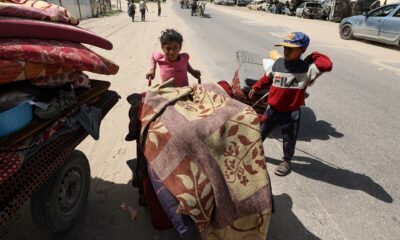
 Middle East1 day ago
Middle East1 day agoIsrael cuts off Rafah, issues new forced displacement orders for Gaza | Israel-Palestine conflict News
-
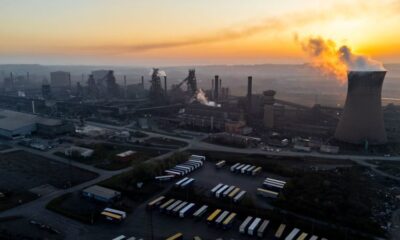
 Europe2 days ago
Europe2 days agoBritish Steel: UK government takes over running of country’s last major steel plant from Chinese owner Jingye
-

 Sports2 days ago
Sports2 days agoTiger Woods’ 2005 Masters chip-in was the shot heard around the world. We almost didn’t see it.
-
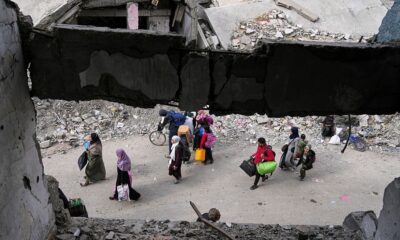
 Africa2 days ago
Africa2 days agoPalestinians face displacement and uncertainty after new Israeli orders
-
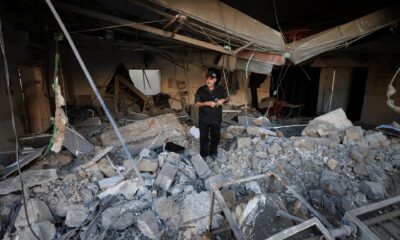
 Middle East16 hours ago
Middle East16 hours agoTimeline: Israel’s attacks on hospitals throughout its war on Gaza | Israel-Palestine conflict News
-
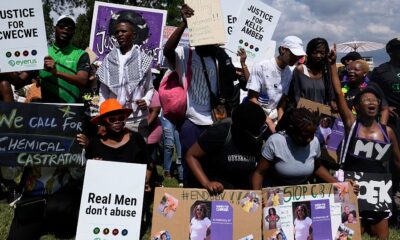
 Africa2 days ago
Africa2 days agoSouth Africans protest gender violence after child rape allegation
-
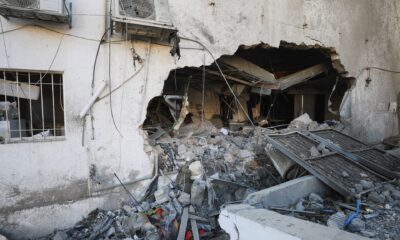
 Conflict Zones20 hours ago
Conflict Zones20 hours agoGaza’s al-Ahli Hospital targeted by Israeli missiles | Israel-Palestine conflict News
-

 Sports22 hours ago
Sports22 hours ago‘He’s out of his mind right now’: Rory McIlroy blazes to historic third round lead at the Masters




